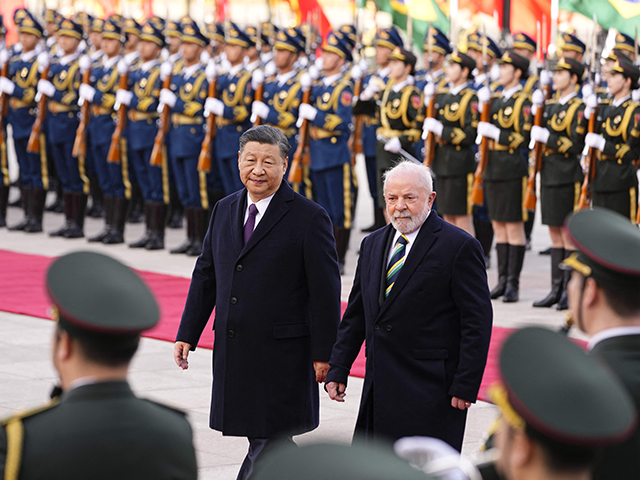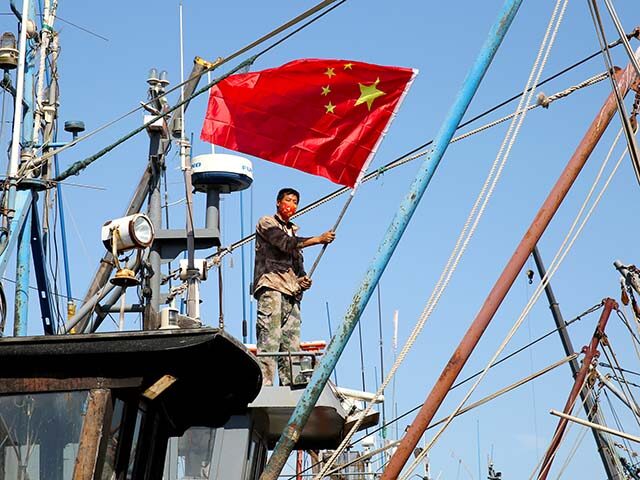Illegal Chinese fishing boats are plundering some of the Brazilian Amazon’s most fertile fishing grounds, sweeping up a wide variety of species including endangered fish, and significantly harming the national fishing trade, a local mayor told the Argentine news outlet Infobae in a report published Tuesday.
Infobae visited the island of Marajó, Pará state, where Mayor Carlos Augusto Gouvêa lamented that large Chinese cargo ships steal even the local fresh water, apparently to profit from selling it to the arid Middle East. The island is located in far-north Brazil, off the Atlantic Ocean but surrounded by rivers and estuaries that create fertile fishing grounds.
Gouvêa’s complaints echo years of alarm from neighboring countries such as Ecuador, Chile, Peru, Colombia, and Argentina that the Chinese Communist Party is allowing its prodigious fleet of fishing vessels into the sovereign waters of South American nations for the purposes of illicitly exploiting their natural resources. Argentina went as far as sinking a Chinese fishing ship in 2016 for illegally entering its waters and attacking an Argentine Coast Guard vessel.
“The Chinese fishing boats use specific techniques to drag more fish from the ocean, normally they shouldn’t do that close to the coast but the Chinese boats do it,” Gouvêa told Infobae. The ships, he continued, also “fill their boasts of freshwater from the Amazon to take it to other places.”
“They take it to the Middle East, it is cheaper to ship that water than to desalinate the water over there,” the mayor said.
Gouvêa lamented the illegal fishing “has a very strong impact, but it is something that it is not within the authority of the mayor, it’s [under] the authority of the federal government – it’s something the central government should take charge of.”
Gouvêa said that he had not directly discussed the issue with Brazilian President Luiz Inácio Lula da Silva, but “the government knows what is happening.”

Chinese President Xi Jinping (L) and Brazil’s President Luiz Inacio Lula da Silva attend a welcome ceremony at the Great Hall of the People in Beijing on April 14, 2023. (KEN ISHII/POOL/AFP via Getty Images)
Lula, a hardline socialist, has prioritized friendly ties with China since he took office for a third term in January after defeating pro-China conservative Jair Bolsonaro in the October presidential race. Lula made a visit to Beijing one of his first international engagements, traveling there in April and signing 15 memoranda of understanding on trade, security, and space exploration, among other issues. Lula has aggressively campaigned to replace the U.S. dollar as a standard international trade currency with the Chinese yuan, brokering a deal in March to allow Brazilian businesses to use the yuan for deals with Chinese companies.
Lula has also publicly considered joining China’s Belt and Road Initiative (BRI), a debt trap scheme in which the Communist Party offers poor countries predatory loans for infrastructure projects.
Lula campaigned as a firebrand environmentalist, joining the chorus of leftists around the world condemning Bolsonaro for allegedly allowing the destruction of the Amazon Rainforest, sometimes using outright misinformation to attack the former president. None of the high-profile environmentalists or celebrities who endorsed Lula have yet to condemn his inaction in the face of Chinese illegal fishing at press time.
RELATED VIDEO — Nikki Haley: China “Is the Biggest Threat We’ve Had Since Pearl Harbor”:
While Lula himself has reportedly not raised the issue, the Brazilian military reportedly complained to its Chinese counterparts regarding the impossible-to-ignore presence of Chinese fishing ships in territories where they have no legal right to be during recent conversations. According to the South China Morning Post, Brazilian naval leaders protested the illegal fishing during an engagement in which multiple senior Chinese naval officials traveled to Brazil for a military exchange in June.
“The Brazilian military complained about Chinese fishing vessels leaving the African coast, sailing through Atlantic waters without being tracked, and engaging in illegal fishing,” the Morning Post reported, citing the left-wing Folha de Sao Paulo newspaper.
China has become the top seller in Amazon-native fish species for food in the world, the BBC reported in January.
Beijing’s presence in South America is far from limited to Brazil. For much of the past decade, the continent’s leaders have identified Chinese fishing vessels as a serious environmental threat.
RELATED VIDEO — Four Children Rescued After Lost for 40 Days in Amazon Jungle After Surviving Plane Crash:
In a joint statement in 2020, for example, the governments of Ecuador, Peru, Chile, and Colombia issued a joint statement expressing “their concern about the recurring presence of fleets of foreign-flagged fishing vessels, which are carrying out fishing activities in the high seas areas adjacent to the marine zones under national jurisdiction of the Republics of Ecuador, Colombia, Chile, and Peru.” The countries warned the illegal fishermen of their “firm will” to act against them.
While not naming China directly, the statement followed multiple complaints from the nations about illegal fishing by Chinese ships. Ecuador, in particular, has repeatedly complained of China pillaging its Galapagos Islands, a UNESCO World Heritage Site largely considered one of the world’s top natural wonders. In 2020, the Ecuadorian Navy identified 260 ships, believed to be Chinese, navigating around Ecuador’s Galapagos waters.
A study published last year found that the vast majority of man-made ocean waste around the Galapagos “comes from Chinese boats that fish for giant squid every year in [waters near] Ecuador,” Ecuador’s Environment Minister Gustavo Manrique asserted at the time.
Follow Frances Martel on Facebook and Twitter.


COMMENTS
Please let us know if you're having issues with commenting.